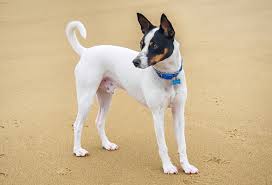
Tenterfield Terrier
Conditions of detention
Tenterfield Terriers are adaptable and can thrive in various living environments, from rural farms to urban apartments. They require regular exercise and mental stimulation to prevent boredom.
Useful Fact: These terriers are well-suited for active families or individuals who can provide them with daily playtime and outdoor activities.
Nutrition and diet
A balanced diet rich in protein and healthy fats is essential for the Tenterfield Terrier. High-quality commercial dog food or a mix of fresh ingredients like meat, vegetables, and grains is recommended.
Useful Fact: Feeding a diet that supports their energy levels helps maintain their health and vitality, particularly given their active nature.
Health
Tenterfield Terriers are generally healthy dogs, but they can be prone to certain genetic conditions such as patellar luxation and hip dysplasia. Regular veterinary check-ups are essential.
Useful Fact: Early health screenings and responsible breeding practices can help reduce the risk of hereditary conditions in Tenterfield Terriers.
Grooming and care
The Tenterfield Terrier has a short, smooth coat that requires minimal grooming. Regular brushing helps remove loose hair and keep their coat healthy.
Useful Fact: Their low-maintenance coat makes them easy to care for, requiring only occasional baths and regular brushing to maintain cleanliness.
Education and training
Tenterfield Terriers are intelligent and eager to please, making them relatively easy to train. They respond well to positive reinforcement and consistency.
Useful Fact: Early socialization and obedience training are crucial to harness their natural hunting instincts and ensure they are well-behaved around people and other animals.
Toys and entertainment
Tenterfield Terriers enjoy toys that challenge their minds and bodies, such as fetch toys, puzzle toys, and interactive games. Engaging in activities like agility training can be very stimulating for them.
Useful Fact: Providing a variety of toys and regular playtime can prevent boredom and destructive behavior, keeping them mentally and physically active.
Safety
Due to their strong prey drive and curiosity, Tenterfield Terriers should be kept on a leash or in a secure area when outdoors to prevent them from chasing small animals.
Useful Fact: A well-fenced yard is ideal for giving them the freedom to explore and play safely without the risk of escaping.
Accessories
Sturdy collars, harnesses, and leashes are important for managing the Tenterfield Terrier during training and outdoor activities.
Useful Fact: Using a harness can provide better control and prevent neck strain, especially during walks and running sessions.
Socialization
Tenterfield Terriers are friendly and form strong bonds with their families but can be wary of strangers. Early and consistent socialization is important to ensure they are comfortable in various environments.
Useful Fact: Introducing them to different people, animals, and settings from a young age helps them become well-adjusted and confident adults.
Travel and Transportation
Tenterfield Terriers can travel well if they are accustomed to it from a young age. Ensuring they have a comfortable and secure space in the vehicle is important.
Useful Fact: Using a travel crate or a harness designed for car travel ensures their safety and comfort during trips.
Behavior and psychology
The Tenterfield Terrier is known for its loyalty, intelligence, and strong hunting instincts. They form strong bonds with their families and are naturally protective.
Useful Fact: Understanding their energetic nature and providing proper training can help manage their behavior and ensure they are confident and well-behaved.
Legal aspects
Owners should comply with general dog ownership laws, such as licensing, vaccination requirements, and leash laws.
Useful Fact: In some areas, there may be specific regulations regarding small terrier breeds, so checking local laws is important.


